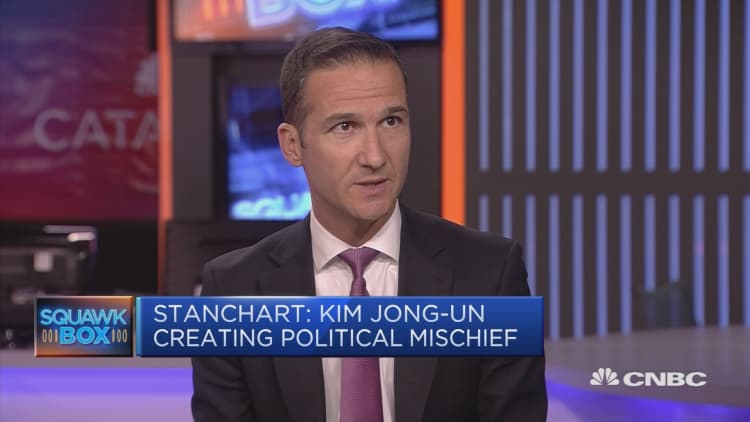
While North Korea's repeated missile tests and defiance of international sanctions may seem erratic to onlookers, Supreme Leader Kim Jong Un's latest move demonstrates a "very rational" strategy based on an "sense of acute timing," one strategist told CNBC.
Philippe Dauba-Pantanacce, global geopolitical strategist at Standard Chartered Bank, explained that the pariah state's latest missile test was timed specifically while U.S. President Donald Trump was busy with Hurricane Harvey, and a coherent coalition between China, Russia and other international players is yet to be assembled. The most recent missile flew over the northern Japanese island of Hokkaido earlier this week.
"From (Kim Jong Un's) perspective, basically all options on the table for the international community are bad, and he knows that," Dauba-Pantanacce said. So, Kim Jong Un is strengthening his hand by trying "to get to the point where he's recognized as a nuclear power," he added.
"The latest missile launch, and what he's been trying to do, is actually very rational. The latest launch was responding to a technical imperative," Dauba-Pantanacce explained. Kim's move to test the missile at a more horizontal angle was "to prove that they can reach a certain distance" – namely, North Korea's threat against the U.S. Pacific territory of Guam. Up until now, missile tests have been vertical, Dauba-Pantanacce added.
The international community seems to be stuck between a rock and a hard place. "Upping the rhetoric is dangerous," Dauba-Pantanacce argued, saying that this sets precedent for stronger moves to come. This could be difficult to achieve given the "fragile, if not fractured coalition" at the United Nations Security Council (UNSC).

The U.S. has toned down its response to the crisis since Trump's "fire and fury" claim earlier this month, with U.S. Secretary of State Rex Tillerson saying over the weekend that his country would seek to uphold "peaceful pressure."
Strong rhetoric and more sanctions?
There is "no possibility … of a military strike from the U.S. which would cause disastrous consequences to Seoul in particular," Dauba-Pancanacce said, adding that the only options available were strong rhetoric and more sanctions.
The UNSC, in a meeting Tuesday, condemned North Korea's latest flexing of its muscles as "outrageous" but did not increase the present sanctions, already at their toughest ever. A U.S.-drafted statement said that it was of "vital importance" that North Korea ended its nuclear program.
But China and Russia, permanent members on the Security Council and therefore with the power to veto sanctions, are understood to only consider the testing of a nuclear missile or long-range weapon as worthy of triggering increased sanctions. They warned against the U.S. potentially deploying a missile system to South Korea.
"China would likely stay on the sidelines" should the U.S. and South Korea opt for military involvement in the North, Gina Sanchez, CEO of consultancy firm Chantico Global, told CNBC Wednesday. Intervention would only be a "very quick geopolitical event," she added.
Additional reporting by Reuters

